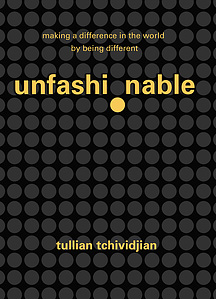The last book of 2011 for me was Unfashionable: Making a Difference in the World by being Different by Pastor Tullian Tchividjian. If you are tired of trying to keep up with what “they have”, what “they do”, where “they go”, what “they wear”, and who “they hang out with”…you will really appreciate this book and it’s reminder that the gospel is our calling, not the rat race that our culture tries to tempt us with. Far too often, I am guilty of missing out on what Christ has for me because I am too distracted with the things of this world. As we close out 2011 and prepare to jump headlong into 2012, Unfashionable was a great reminder that Christ is counting on me to be “his agent of renewal” in a lost and dying world.
I highlighted a number of things while reading and have pasted them below. I hope you’ll read this book and examine what matters most as you seek His glory and the good of others.
- Fashion is the law of multitudes, but it is nothing more than the common consent of fools. (Charles Spurgeon)
- Christians make a difference in this world by being different from this world; they don’t make a difference by being the same.
- Just when our culture is yearning for something different, many churches are developing creative ways to be the same.
- The cross is the supreme revealer of the radical difference between this world’s values and the values of God.
- Faithfulness to Christ requires foreignness to the world’s trendy diversions.
- Worldliness, as I’ve explained it, seems to have two components: vertical and horizontal. The vertical component is living for self rather than God. The horizontal component is sinfully corrupting society and culture (misdirecting the structural goods of creation).
- During the Protestant Reformation in the sixteenth century, five Latin phrases emerged as summary statements to identify core Christian beliefs: sola Scriptura (Scripture alone), sola fide (faith alone), sola gratia (grace alone), solus Christus (Christ alone), and soli Deo Gloria (glory to God alone).
- Stripped of the diving resource we need to discern between the ultimately true and the ultimately false, everything becomes a matter of private opinion.
- Besides revealing the truth about God, the Bible reveals the truth about us—who we are and how we’re to live. It’s where God clarifies what our priorities, passions, and pursuits ought to be.
- We can love this world because it is God’s, and it will be healed, becoming at last what God intended from the beginning. We are not merely passing through this world and this life. We are shaping the building blocks of eternity. (Paul Marshall)
- We’ve been redeemed by God to become agents of renewal.
- When we don’t have a clear sense of what makes us different, we lose our ability to make a difference.
- It makes no sense to live according to the old ways when we’ve become new.
- We’re the people of the future, formed by the past, and living in the present.
- The world desperately needs the church to be the church, reflecting the kingdom of God so that those who are lost will know where to turn when their own kingdoms begin to collapse.
- As God’s current agents of renewal, our effectiveness depends on our faithfulness to live according to God’s standards, as opposed to the standards of this world.
- We’re to be morally and spiritually distinct without being culturally segregated.
- Contextualization without compromise must be our goal.
- God intends his people to be a visual model of the gospel.
- The only way to maintain our unity in Christ is by showing our commitment to him through our commitment to one another.
- Healthy community relies on people who invest in one another, serve one another, provide for one another, and defer to one another. Without this “one-anotherness” genuine community cannot exist.
- Trust will disappear in a culture that does away with truth.
- When we see the restlessness and wreckage in people’s lives become they’re not in relationship with God and they’re living sinfilled lives, it should stoke our anger—an anger that arises because we love them and we grieve to see them living for something so destructive when God created them to live for something beautiful and satisfying.
- In a world of thievery, our openhandedness just might be a more compelling witness than being able to give five rational proofs for the existence of God, as important as that is.
- Encouragement is noticing God’s reflection in other people’s strengths and gifts, then verbally affirming what we see.
- Hebrews 10:24-25 And let us consider how to stir up one another to love and good works, not neglecting to meet together, as is the habit of some, but encouraging one another, and all the more as you see the Day drawing near.
- When we choose to speak redemptively—the way God intended—our words become a means of transforming grace.
- The church is to be a community that distinguishes itself by treating people well.
- Technology connects us broadly with others but not deeply.
- Faithfully following Christ requires that Christians maintain a constant state of culture shock in relation to the sinful patterns of this world.


